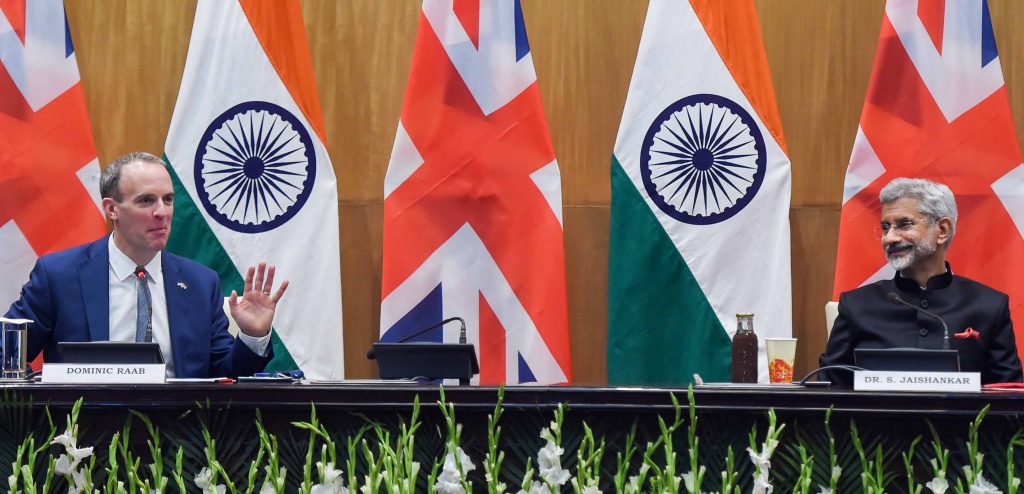New Delhi: British Prime Minister Boris Johnson will visit India next month to attend the Republic Day celebrations as the chief guest. This announcement was made by UK Foreign Secretary Dominic Raab here Tuesday. Dominic Raab shared the information at a press conference after holding talks with External Affairs Minister S Jaishankar. During the meeting the two sides agreed on the key elements of an ambitious 10-year roadmap to further broaden ties, and also boost strategic cooperation in the Indo-Pacific region.
In their wide-ranging talks, Jaishankar and Raab also discussed having an ‘Enhanced Trade Partnership’ by next year that could be a stepping stone towards a future free trade agreement.
Jaishankar told reporters that the nearly four-hour talks focused on five key areas. They are trade and prosperity, defence and security, climate change, healthcare and people-to-people connectivity.
The two sides also reviewed the situation in Afghanistan, the evolution of the Indo-Pacific and developments in the Middle East besides discussion on shared concerns over challenges posed by terrorism and radicalism, he said.
“Overall, it would be fair to say that we had a very productive discussion as our partnership becomes more ambitious and consequential,” Jaishankar said.
“Prime Minister Boris Johnson has invited Prime Minister Narendra Modi to join the UK-hosted G7 summit next year. The UK Prime Minister has also accepted the very generous invitation to attend India’s Republic Day celebrations (as chief guest) in January which is a great honour,” Raab told mediapersons.
Johnson will be the second British Prime Minister to grace the Republic Day celebrations after John Major in 1993. Overall, he is set to be the sixth British leader to grace the occasion.
According to Downing Street, Johnson while describing India as a key player in the Indo-Pacific region said that his visit will mark the start of an ‘exciting year’ for Global Britain and deliver a ‘quantum leap’ in the bilateral ties.
“I am absolutely delighted to be visiting India next year at the start of an exciting year for Global Britain, and look forward to delivering the quantum leap in our bilateral relationship that Prime Minister Modi and I have pledged to achieve,” said Johnson.
“As a key player in the Indo-Pacific region, India is an increasingly indispensable partner for the United Kingdom as we work to boost jobs and growth, confront shared threats to our security and protect our planet,” added Johnson.
Talking about growing congruence in strategic ties, the British foreign secretary said a closer relationship with India, and the wider Indo-Pacific region, is one of the ‘very highest policy priorities’ for the UK government. He said the UK’s integrated strategic policy review will contain an ‘Indo-Pacific tilt’, noting that there is ‘no stronger partner’ for his country in the east than India.
Raab further said:”We agreed on the key elements of a 10-year UK-India roadmap so that we can deliver a step change in ambition for the relationship between our two countries.”
Raab pointed out that the proudest example of the UK-India partnership is on COVID-19. Both countries want to make sure the most vulnerable regions around the world get equitable distribution and access to the vaccine against the virus, he said.
Oxford University, AstraZeneca and the Serum Institute India (SII) have been working closely together on the vaccine front. The SII is now planning to produce one billion doses of the Oxford vaccine by the end of next year. Many units of the vaccine will be destined for low and middle income countries, Raab said at the joint press event after the talks.
“That is the UK and India working together to transform people’s lives around the world. We want to take advantage of these vaccines, not only for our own people but to make sure the most vulnerable and poorest countries around the world get equitable distribution and access,” Raab said. “Perhaps, the proudest example of our partnership today is on COVID-19,” he added.
